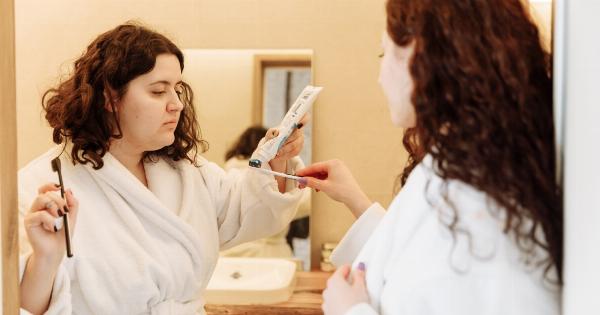Brushing your teeth is a daily habit that most people have been doing since childhood. It is an essential step in maintaining good oral hygiene and preventing dental problems such as cavities, gum disease, and bad breath.
While the act of brushing itself is important, many people wonder whether timing their toothbrushing can make a difference in its effectiveness. Should you brush your teeth first thing in the morning, before or after meals, or right before bed? In this article, we will explore the best timing for toothbrushing based on expert opinions and scientific research.
The Importance of Brushing Your Teeth
Before delving into the timing aspect, let’s first understand why brushing your teeth is crucial for your oral health. The primary purpose of brushing is to remove plaque, a sticky film of bacteria that continuously forms on your teeth.
If not removed, plaque can lead to tooth decay, gum inflammation, and other dental problems.
Brushing your teeth twice a day is the recommended frequency by dental professionals. This frequency ensures that you remove the accumulated plaque and any leftover food particles that can promote bacteria growth.
Additionally, brushing your teeth helps maintain fresh breath and maintain the appearance of your smile.
Brushing in the Morning
Many people adopt the habit of brushing their teeth first thing in the morning. This makes sense as it helps freshen the mouth after a night’s sleep and removes the overnight buildup of bacteria.
However, it is important to note that brushing immediately after consuming acidic foods or beverages, such as orange juice or coffee, can cause enamel erosion. Therefore, it is advisable to wait for 30 minutes after consuming such substances before brushing to prevent damage to the tooth enamel.
Brushing After Meals
Another common practice is brushing your teeth after meals. While it may seem logical to remove food particles and prevent plaque buildup immediately, it is not always the best strategy.
Some foods, especially those that are high in acidic content, can weaken the tooth enamel temporarily. Brushing immediately after consuming acidic foods can potentially cause enamel erosion.
It is recommended to wait for at least 30 minutes before brushing to allow the saliva to neutralize the oral pH levels and restore the tooth enamel to its normal state.
However, if you have consumed foods that are high in sugar or have a sticky consistency, it may be advisable to brush your teeth soon after finishing your meal. These types of foods can foster bacterial growth and increase the risk of tooth decay.
Consulting with your dentist can help you determine the best course of action.
Brushing Before Bedtime
Brushing your teeth before bedtime is a crucial component of your oral hygiene routine. During sleep, saliva production decreases, allowing bacteria to thrive.
Brushing before going to bed helps remove plaque and any food debris that may have accumulated throughout the day. It also ensures that your mouth remains clean during the night, reducing the risk of dental issues.
Therefore, it is highly recommended to brush your teeth thoroughly before bedtime. Be sure to take your time and cover all surfaces of your teeth, including the gumline.
Using a fluoride toothpaste and a soft-bristle toothbrush can further enhance the cleaning process.
Other Considerations for Effective Toothbrushing
While timing is essential, it is equally important to brush your teeth correctly for optimal results. Here are a few additional considerations to keep in mind:.
1. Brushing Technique
Using the correct brushing technique is crucial. Dentists recommend using a soft-bristle toothbrush with a small head and holding it at a 45-degree angle against the gumline.
Use gentle, circular motions to clean the front, back, and chewing surfaces of your teeth. Avoid harsh scrubbing as it can damage your gums and tooth enamel.
2. Brushing Duration
The recommended brushing duration is two minutes. It is easy to underestimate the time spent brushing, so using a timer or toothbrush with a built-in timer can help ensure you dedicate enough time to thoroughly clean your teeth.
3. Toothbrush Replacement
Over time, toothbrush bristles can become frayed and lose their effectiveness. It is recommended to replace your toothbrush or toothbrush head every three to four months, or sooner if the bristles become worn.
Using a worn-out toothbrush can hinder effective cleaning.
4. flossing and Mouthwash
Brushing alone is not enough to maintain optimal oral hygiene. It is crucial to supplement your routine with daily flossing and mouthwash use.
Dental floss helps remove plaque and food particles from between your teeth, while mouthwash can help kill bacteria and freshen your breath.
Conclusion
The timing of your toothbrushing plays a significant role in maintaining good oral health. However, there is no one-size-fits-all approach, as individual factors and dietary habits can influence the ideal timing for you.
As a general guideline, brushing your teeth first thing in the morning to remove overnight buildup and before bedtime to eliminate plaque and food debris accumulated during the day is recommended. Remember to wait for about 30 minutes after consuming acidic foods or beverages before brushing to protect your tooth enamel. Always consult with your dentist for personalized advice on the best toothbrushing routine for your specific needs.




























